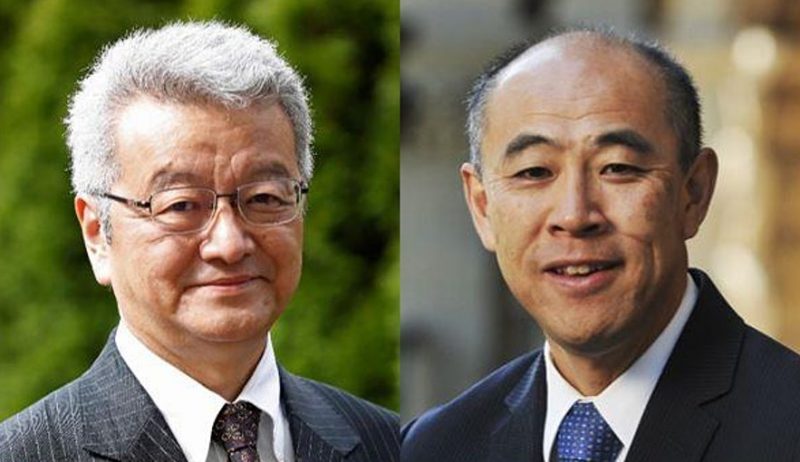The Japanese Economy, Second Edition: Book Launch

On December 4, 2020 The Japanese Economy, Second Edition: Book Launch was held online
You can watch the video of Webinar here.
| Date(s) | Saturday, 5 December 2020, 8:00-9:30am (JST) (Friday, 4 6:00-7:30pm EST) |
|---|---|
| Venue |
Zoom Webinar |
| Registration | Pre-registration required |
| Language | English (No translation available) |
| Abstract |
The Japanese Economy, Second Edition: Book Launch
What you’ll learn:
You must register for the webinar to receive the login details. Participants will receive a link to access the live webinar upon registration → https://www.eventbrite.com/e/the-japanese-economy-second-edition-book-launch-tickets-128889841987 |
| Speaker Profile |
Takatoshi Ito is the director of the Program on Public Pension and Sovereign Funds and associate director of research at the Center on Japanese Economy and Business of Columbia Business School. He is also a professor at the School of International and Public Affairs at Columbia University. He has taught extensively both in the United States and Japan since his finishing Ph.D. in economics at Harvard University in 1979. He taught as assistant and tenured associate professor (1979-88) at University of Minnesota, as associate and full professor at Hitotsubashi University (1988-2002), as professor at the Graduate School of Economics at University of Tokyo (2004-2014) before assuming his current position in 2014. He held visiting professor positions at Harvard University, Stanford University; Columbia Business School, and Tun Ismail Ali Chair Professor at University of Malaya. He has distinguished academic and research appointments such as president of the Japanese Economic Association in 2004; fellow of the Econometric Society, since 1992; research associate at the National Bureau of Economic Research since 1985; and faculty fellow at the Centre for Economic Policy Research, since 2006. He was editor-in-chief of the Journal of the Japanese and International Economies, and is co-editor of the Asian Economic Policy Review. In an unusual move for a Japanese academic, Ito was also appointed in the official sectors, as senior advisor in the Research Department at the International Monetary Fund (1994-97) and as deputy vice minister for International Affairs at the Ministry of Finance, Japan (1999-2001). He served as a member of the Prime Minister’s Council on Economic and Fiscal Policy (2006-2008). In 2010, he was a co-author of a commissioned study of the Bank of Thailand 10th year review of inflation targeting regime. He contributes frequently op-ed columns and articles to Financial Times and Nihon Keizai Shinbun. He is an author of many books including The Japanese Economy (MIT Press, 1992), The Political Economy of the Japanese Monetary Policy(1997) and Financial Policy and Central Banking in Japan (2000) (both with T. Cargill and M. Hutchison, MIT Press), An Independent and Accountable IMF (with J. De Gregorio, B. Eichengreen, and C. Wyplosz, 1999), and more than 130 academic (refereed) journal articles, including Econometrica, American Economic Review, and Journal of Monetary Economics, and chapters in books on international finance, monetary policy, and the Japanese economy. His research interest includes capital flows and currency crises, microstructures of the foreign exchange rates, and inflation targeting. The National Medal with Purple Ribbon was awarded in June 2011 for his excellent academic achievement. Takeo Hoshi is Professor of Economics at the University of Tokyo. His research area includes corporate finance, banking, monetary policy and the Japanese economy. Hoshi is also Co-Chairman of the Academic Board of the Center for Industrial Development and Environmental Governance (Tsinghua University). His past positions include Henri and Tomoye Takahashi Senior Fellow at the Freeman Spogli Institute for International Studies at Stanford University and Pacific Economic Cooperation Professor in International Economic Relations at University of California, San Diego. He received the 2015 Japanese Bankers Academic Research Promotion Foundation Award, the 2011 Reischauer International Education Award of Japan Society of San Diego and Tijuana, the 2006 Enjoji Jiro Memorial Prize of Nihon Keizai Shimbun, and the 2005 Japan Economic Association-Nakahara Prize. His book Corporate Financing and Governance in Japan: The Road to the Future (MIT Press, 2001) co-authored with Anil Kashyap received the Nikkei Award for the Best Economics Books. He co-authored The Japanese Economy (MIT Press, 2020) with Takatoshi Ito. His book on the political economy of the Abe administration co-edited with Phillip Lipscy is published from Cambridge University Press in 2021. Other publications include “Will the U.S. and Europe Avoid a Lost Decade? Lessons from Japan’s Post Crisis Experience” (Joint with Anil K Kashyap), IMF Economic Review, 2015; and “Zombie Lending and Depressed Restructuring in Japan” (Joint with Ricardo Caballero and Anil Kashyap), American Economic Review, December 2008. Hoshi received his B.A. from the University of Tokyo in 1983, and a Ph.D. in Economics from the Massachusetts Institute of Technology in 1988. |
| Organized by | Joint Event: Center on Japanese Economics and Business, Columbia Business School and Tokyo College, The University of Tokyo |
| Contact | cjeb@columbia.edu |














